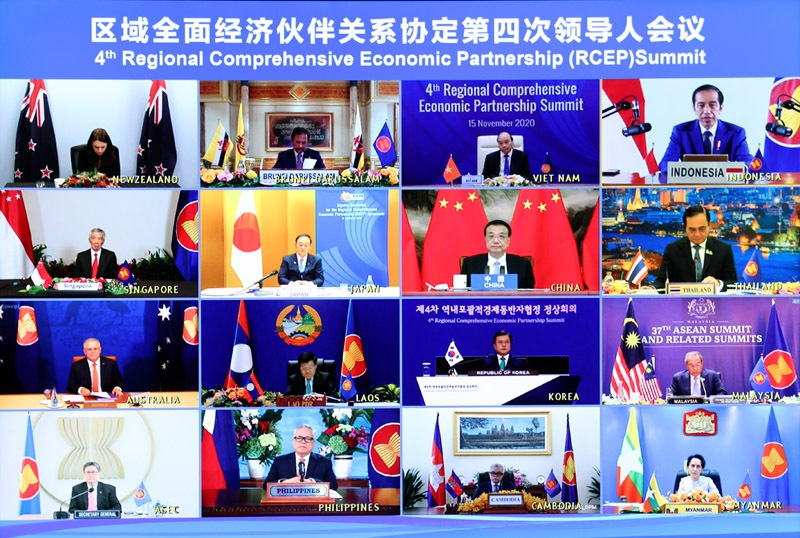
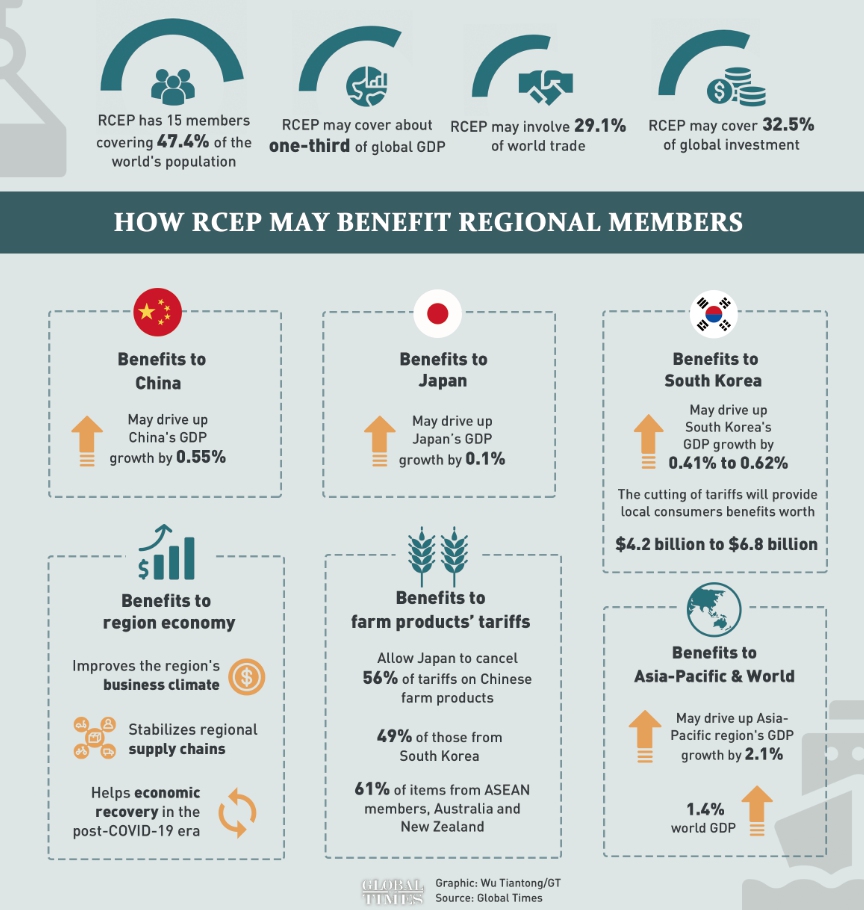
;
China and 14 other economies signed the world's largest trade deal, the Regional Comprehensive Economic Partnership (RCEP), on Sunday to form a free trade zone in the Asia-Pacific region that will encompass a third of the global economy, in what Chinese officials and experts call a historic win for multilateralism that would help the regional and global economies cope with the COVID-19 pandemic and rising protectionism.
Chinese Premier Li Keqiang said that signing of the RCEP is not only an achievement of landmark significance in East Asian regional cooperation, but is also a victory of multilateralism and free trade.
"Signed after eight years of negotiation, the RCEP lets people see brightness and hope in shadows, proving that multilateralism and free trade remain the main and correct course as well as the right direction for the global economy and mankind," Li said.
Signed at a critical turning point in the global political climate – when the next US administration is set to come into office and the world is grasping for solutions to tackle challenges arising from the coronavirus pandemic, the new regional deal would also help the Asia Pacific region take the global lead in recovering from the COVID-19 pandemic and reduce US hegemony in the region, experts said.
The deal, which encompasses Japan, China, South Korea, Australia and the 10 members of the Association of Southeast Asian Nationals, will create what is believed to be the world's largest free trade zone, covering about one-third of the world's total population and GDP. It will be also Japan's first free trade framework with its vital trading partners China and South Korea.
Notably, two major economies – the US and India – were left out of the trade pact. The US, under President Donald Trump, has been pushing for bilateral deals rather than multilateral ones. India was part of the negotiations, but did not join the final agreement.
The RCEP, which contains 20 chapters covering a wide range of areas from merchandise trade to investment to e-commerce, is “modern, comprehensive and high-level win-win agreement,” China’s Finance Ministry said on Sunday, adding that under the deal, members will aim to reduce tariffs to zero in the coming decade.
Bao Jianyun, professor of the School of International Studies and director of the Center for International Political Economy Studies at Renmin University of China, said that signing of the RCEP showed China, which played a very active role in pushing for the deal, has led the way in liberalizing trade and promoting a global market order of free competition.
"At the same time, China provides the world with a Chinese model and a Chinese solution on the open platform, where it serves the world," Bao told the Global Times, explaining that China as an emerging power has been a major promoter of trade and investment integration of RCEP.
Chen Fengying, a research fellow at the China Institutes of Contemporary International Relations, also stressed that the successful and long-awaited signing of the megapact has rekindled the world's 'hope and confidence" about a model of cooperation.
"Global cooperation has been defeated in recent years because of rising protectionism and China-US trade friction. But the RCEP's signing is a signal that cooperation does work today, which I think is even more important withthe lift it gives to specific countries' GDP growth," Chen told the Global Times.
Liu Kuikui, a Beijing-based consultant of international transport and trade, told the Global Times that the RCEP will establish a common framework of rules of origin for Asia-Pacific countries, reduce investment barriers, and expand trade and investment. The participation of Japan, South Korea, Australia and New Zealand, allies of the US, demonstrates that the four countries are opposed to the trade protectionism and the economic bullying launched by the US.
Signing of RCEP a victory of multilateralism and free trade: Chinese Premier Li Keqiang
RCEP will end US hegemony in West Pacific
Not joining RCEP a strategic blunder that will lead to India’s isolation in globalization
- Signing of RCEP a victory of multilateralism and free trade: Chinese Premier Li Keqiang
- RCEP will end US hegemony in West Pacific
- Not joining RCEP a strategic blunder that will lead to India’s isolation in globalization
Asia forms world's biggest trade bloc, ,,,
Azmin: M'sia will gain from RCEP
Commentary: RCEP agreement victory for multilateralism, free ...
What RCEP means to Malaysia
RCEP to give momentum to virus-hit world economy: experts
The signing of the Regional Comprehensive Economic Partnership (RCEP), the world's largest free trade agreement (FTA), will give strong momentum to the development of the world's COVID-19-battered economy and cement regional cooperation within East Asia, which has emerged strongest from the pandemic, observers predicted, noting that China, with its economic and market size, will play a driving role in this partnership, yet every member will benefit equally under such framework.
China, ASEAN praise FTA achievements
A report celebrating the milestones and achievements of the ASEAN-China Free Trade Area (ACFTA) highlighted the growth of bilateral trade and investment over the past decade, as well as joint efforts to battle the coronavirus and the safeguarding of regional industrial and supply chains
Chinese premier urges further cooperation, sustainable development to counter challenges amid COVID-19
Chinese Premier Li Keqiang on Saturday called for solidarity, the focus on development and expanded cooperation to join hands in countering the challenges amid the ravaging COVID-19.
Asean, China, Japan, S.Korea vow to keep open markets ...
Keep markets open, Asean+3 urged
Asean and 5 other nations sign world's biggest trade bloc that excludes U.S.
HANOI, Nov 15 (Reuters): Fifteen Asia-Pacific economies formed the world’s largest free trade bloc on Sunday, a China-backed deal that excludes the United States, which had left a rival Asia-Pacific grouping under President Donald
Azmin: RCEP a better deal, CPTPP must be fair |
Related posts:
Economic freedom: Xi leading other Chinese leaders at the fifth plenary session of the 19th Central Committee of the CPC in Beijing on
China 13th Five-Year Plan 2016-20 Summary, sets ‘pragmatic’ targets through 2035
https://www.malaymail.com/ news/malaysia/2020/11/07/ budget-2021-highlights-heres- what-malaysians-can-expect- get-directly-tax-br/1920199 .
LAST Friday, the Finance Minister tabled what is now known as Malaysia’s largest-ever budget. The excellently-crafted and well-wri


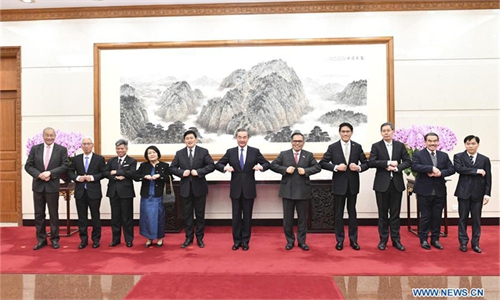
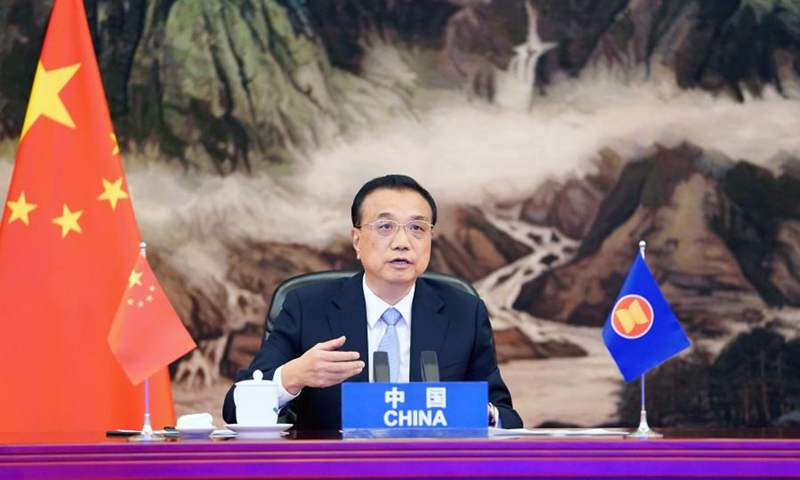







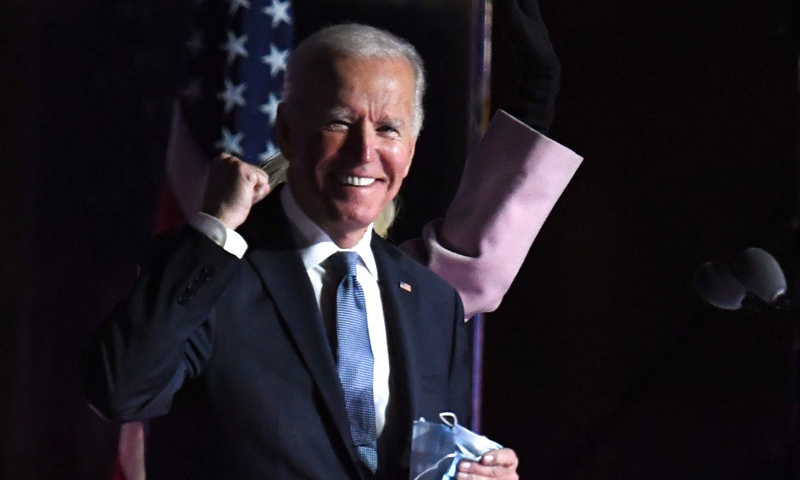 Biden Photo: AFP
Biden Photo: AFP 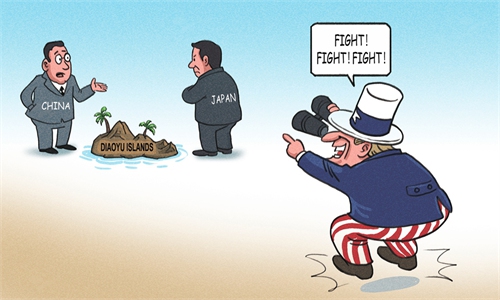
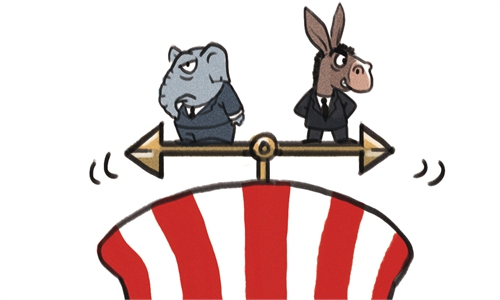
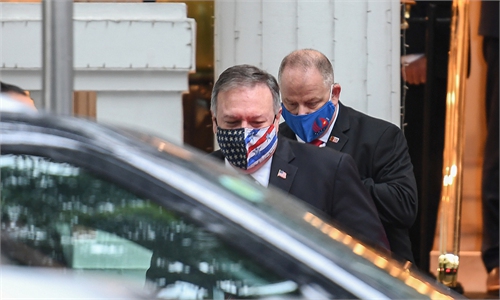
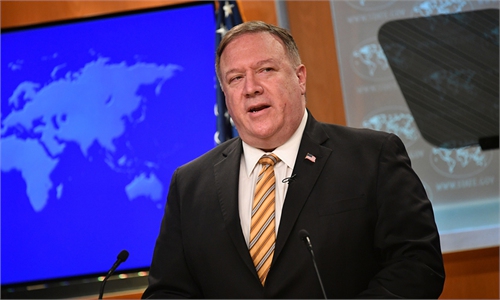
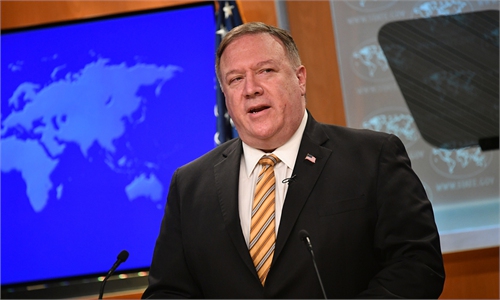

:no_upscale()/cdn.vox-cdn.com/uploads/chorus_asset/file/22024034/US_Covid_19_chart.png)


 The FM really got SHOCKED when LGE asked him whether the budget was approved by the cabinet. Watch the video.
The FM really got SHOCKED when LGE asked him whether the budget was approved by the cabinet. Watch the video.
